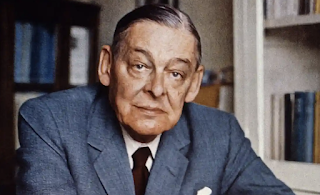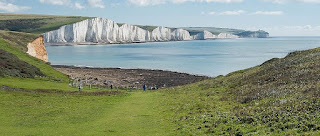I want to apologize for skipping Robert Browning, but I find his work too dark and upsetting to spend a lot of time thinking about. I have a deep appreciation for the gift of reading. It was what my mom pressed into me at a young age. She had a way of reading that helped me to hear, taste, smell, and see what the words were describing. So my imagination was spurred and improved by good books.
I even have to admit that volumes and volumes of comic books helped as well. I read Batman, Sgt. Rock, Superman, and many others as a young boy and the pictures became alive. Then I read every Hardy Boy book ever written and spend many days at the East Lake library consuming everything I could understand.
Right after I became a Christian, a pastor gave me a New Testament copy of "Good News for Modern Man" and I read it cover to cover in about 2 days. At that time the words seemed to be burning into me and I wish it still felt that way- though I love just thinking about little phrases even today... each one like an icon on a screen that you click on and there is volumes of connecting ideas and passages.
As I moved into longer books, I noticed that I read in a voice that matched the characters that were being developed. The same is true of the Bible- I have an inner voice that is my Paul, or Peter, or Jesus... I even read Genesis with a voice I attach to a Moses.
So when I read dark novels or scenes...they become pretty graphic... much more so than any movie or video can capture. I still say that "Interview with a Vampire" is the most personified evil I have ever read in literature and was thrilled when I read the story of that novel and that Anne Rice came back to faith after those dark days of atheism captured by the vampire, Lestat.
I also have to mention the axe murder scene in Crime and Punishment by Dostoevsky. That one shook me up.
So the same is true with poetry... I feel it deep in my bones.
This makes me stop and comment on Dover Beach by Matthew Arnold. The poem more popular than the poet. Arnold was a school man raised by a family of school people. I find it sad that he died by a heart attack while running to the train station to see his daughter in April 1888!
I first read Dover Beach in the spring of 1982 and was mesmerized by the picturesque beauty of the white cliffs and was overjoyed when I got to see those cliffs in person when we went there on a mission trip in the summer of 1988. It was exactly as Arnold captured it in his poem.
I had taken a copy of the poem in my pocket for the visit (though it was daytime) and I re-read it as I watched the people on the pebble beach and could just see France in the mist across the sea.
It is a sad poem, the poet is depressed that beauty and faith seems to be on the decline. Though he is steadied by the beauty of his lover who accompanies him.
As I read the poem, I was away from my wife on a trip that lasted two seeks (and no cell phones back then- the distance and silence was awful!). We were there to participate in a Billy Graham crusade in London and had made a day trip to Dover to see the famous white cliffs and enjoy authentic fish and chips.
I too was depressed that faith had withered in England. People went to the church there on two occasions: to be married and buried. I was sad, missing my wife, but deeply impacted by the words written over 100 years earlier.
As we stood on the beach, I noticed sounds of pebbles hitting the ground around me and looked over. There were French college students who were sneering at us and throwing the pebbles at us! It seems they knew we were Americans, we were as loud and obnoxious as the stereotype they held about us.
I remember praying for them and that there would be revival in England and if we are honest, we are more like England today. We need revival in our land as well!
I haven't been back- now close to 35 years ago, but I can still feel the breeze and hear the 'grating roar of pebbles which the waves draw back, and fling'.
DOVER BEACH by Matthew Arnold
The sea is calm tonight.
The tide is full, the moon lies fair
Upon the straits; on the French coast the light
Gleams and is gone; the cliffs of England stand,
Glimmering and vast, out in the tranquil bay.
Come to the window, sweet is the night-air!
Only, from the long line of spray
Where the sea meets the moon-blanched land,
Listen! you hear the grating roar
Of pebbles which the waves draw back, and fling,
At their return, up the high strand,
Begin, and cease, and then again begin,
With tremulous cadence slow, and bring
The eternal note of sadness in.
Sophocles long ago
Heard it on the Ægean, and it brought
Into his mind the turbid ebb and flow
Of human misery; we
Find also in the sound a thought,
Hearing it by this distant northern sea.
The Sea of Faith
Was once, too, at the full, and round earth’s shore
Lay like the folds of a bright girdle furled.
But now I only hear
Its melancholy, long, withdrawing roar,
Retreating, to the breath
Of the night-wind, down the vast edges drear
And naked shingles of the world.
Ah, love, let us be true
To one another! for the world, which seems
To lie before us like a land of dreams,
So various, so beautiful, so new,
Hath really neither joy, nor love, nor light,
Nor certitude, nor peace, nor help for pain;
And we are here as on a darkling plain
Swept with confused alarms of struggle and flight,
Where ignorant armies clash by night.
As I grow older, it helps me to embrace these feelings and pursue the hope we have in Christ.
Yes, the reality of entropy, sin, and the curse still sweeps our minds but we can't give up faith, hope, and love. The beauty of creation still remains as proof that God is there and He does care.
The world still throws pebbles.... and there are times we deserve it. But the love of Christ will never retreat from us.
THROWING STONES
[5] When King David came to Bahurim, there came out a man of the family of the house of Saul, whose name was Shimei, the son of Gera, and as he came he cursed continually. [6] And he threw stones at David and at all the servants of King David, and all the people and all the mighty men were on his right hand and on his left. [7] And Shimei said as he cursed, “Get out, get out, you man of blood, you worthless man! [8] The LORD has avenged on you all the blood of the house of Saul, in whose place you have reigned, and the LORD has given the kingdom into the hand of your son Absalom. See, your evil is on you, for you are a man of blood.”
[9] Then Abishai the son of Zeruiah said to the king, “Why should this dead dog curse my lord the king? Let me go over and take off his head.” [10] But the king said, “What have I to do with you, you sons of Zeruiah? If he is cursing because the LORD has said to him, ‘Curse David,’ who then shall say, ‘Why have you done so?’” [11] And David said to Abishai and to all his servants, “Behold, my own son seeks my life; how much more now may this Benjaminite! Leave him alone, and let him curse, for the LORD has told him to. [12] It may be that the LORD will look on the wrong done to me, and that the LORD will repay me with good for his cursing today.” [13] So David and his men went on the road, while Shimei went along on the hillside opposite him and cursed as he went and threw stones at him and flung dust. [14] And the king, and all the people who were with him, arrived weary at the Jordan. And there he refreshed himself. (2 Samuel 16:5–14 ESV)
[3] The scribes and the Pharisees brought a woman who had been caught in adultery, and placing her in the midst [4] they said to him, “Teacher, this woman has been caught in the act of adultery. [5] Now in the Law, Moses commanded us to stone such women. So what do you say?” [6] This they said to test him, that they might have some charge to bring against him. Jesus bent down and wrote with his finger on the ground. [7] And as they continued to ask him, he stood up and said to them, “Let him who is without sin among you be the first to throw a stone at her.” [8] And once more he bent down and wrote on the ground. [9] But when they heard it, they went away one by one, beginning with the older ones, and Jesus was left alone with the woman standing before him. [10] Jesus stood up and said to her, “Woman, where are they? Has no one condemned you?” [11] She said, “No one, Lord.” And Jesus said, “Neither do I condemn you; go, and from now on sin no more.” (John 8:3–11 ESV)

.jpeg)






